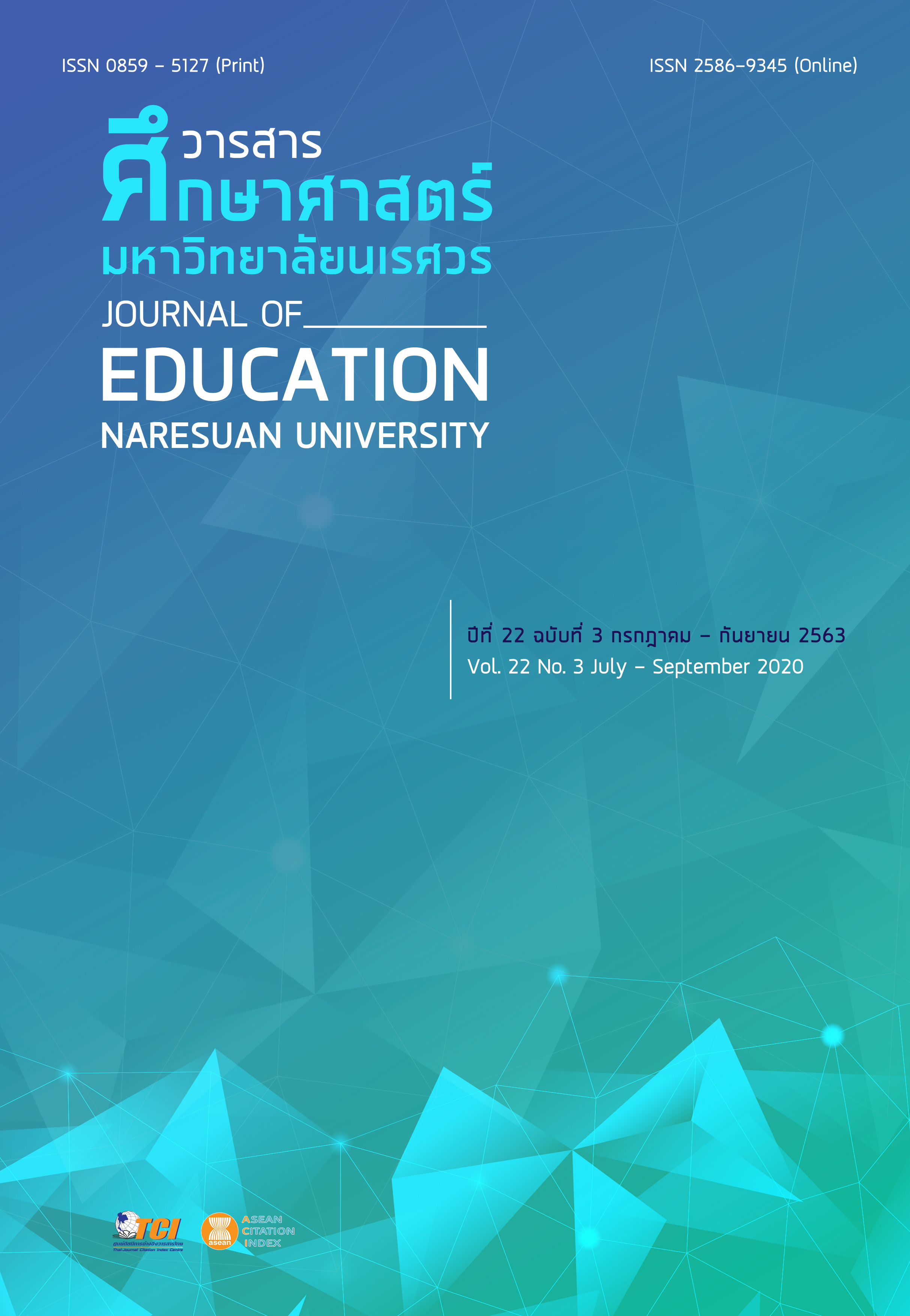DEVELOPMENT OF SCIENTIFIC REASONING ABILITY AND DECISION MAKING OF GRADE 12 STUDENTS THROUGH SOCIO-SCIENTIFIC ISSUES BASED INSTRUCTION ON BIOMOLECULE การพัฒนาความสามารถในการให้เหตุผลเชิงวิทยาศาสตร์และการตัดสินใจของนักเรียนชั้นมัธยมศึกษาปีที่ 6 โดยการจัดการเรียนรู้ตามแนวคิดประเด็นทางวิทยาศาสตร์กับสังคม เรื่อง สารชีวโมเลกุล
Main Article Content
Abstract
This research was aimed to study how to manage learning based on socio-scientific issues that develop scientific reasoning ability for decision making on biomolecules unit of 12th grade students. There were 34 participants. This action research was run three cycles of PAOR. The instruments in this research was consisted in learning management plan, semi-structured learning observation, teacher’s reflective logs, students’ learning logs, and students’ activity sheets. The data were analyzed qualitatively by content analysis. The research was found that the learning management approach should be as follows: the situation should be short and compact. The issues should not be too difficult or complex. Which allow students to use their knowledge in problem solving and method-designing of survey, encourage students to reflect on the importance of reasoning by using valid and reliable evidences which support conclusions and judgements. In addition, a teacher always plays a role in motivating students to discuss their knowledge as a group in classes. The teacher makes an environment fun, relax, and not stressful which allow the students to express themselves. Moreover, after learning management, students developed more scientific reasoning ability for decision making, respectively.
Article Details
The owner of the article does not copy or violate any of its copyright. If any copyright infringement occurs or prosecution, in any case, the Editorial Board is not involved in all the rights to the owner of the article to be performed.
References
Abdallah Salim Zo’bil. (2014). The effect of using socio-scientific issues approach in teaching environmental issues on improving the students’ ability of making appropriate decisions towards these issues. International Education Studies, 7(8), 113-123.
Eggert, S., & Bögeholz, S. (2010). Students' use of decision-making strategies with regard to socioscientific issues: An application of the Rasch partial credit model. Science Education, 94, 230-258.
Eggert, S., et al. (2017). Supporting students’ learning and socioscientific reasoning about climate change the effect of computer-based concept mapping scaffolds. Research in Science Education, 47(1), 137-159.
Johnson-Laird, P. N., & Shafir, E. (1993). The interaction between reasoning and decision making: An introduction. Cognition, 49(1-2), 1-9. https://doi.org/10.1016/0010-0277(93)90033-R
Kanyaprasit, K. (2015). Socio-scientific issues for 21st century skills. Journal of Education Burapha University, 26(2), 1-9. [in Thai]
Kemmis, S., & McTaggart, R. (1988). The action research planer (3rd ed.). Victoria: Deakin University.
Kijkuakul, S. (2014). Science management direction for 21st century teacher. Phetchabun: Juldis Printing. [in Thai]
Lawson, A. E. (2009). Basic inferences of scientific reasoning, Argumentation, and discovery. International Journal of Science Education, 94(2), 336-364.
Moore, J. C., & Rubbo, L. J. (2012). Scientific reasoning abilities of non-science majors in physics-based courses. Physical Review Special Topics-Physics Education Research, 8. 10.1103/PhysRevSTPER.8.010106
Noppakesorn, T. (2005). Qualitative research methodology. Nakhon Ratchasima: Chokcharoen Marketing. [in Thai]
Nuangchalerm, P. (2008). Teaching science based on the socioscientific concept. Journal of Education Mahasarakham University, 2(3), 99-106. [in Thai]
Oulton, C., Dillon, J., & Grace, M. (2004). Reconceptualising the teaching of controversial issues. International Journal of Science Education, 26(4), 411-423.
Reif, F., & Larkin, J. H. (1991). Cognition in scientific and everyday domains: Comparison and learning implications. Journal of Research in Science Teaching, 28(9), 733–760.
Sadler, T. D., & Zeidler, D. L. (2005). Patterns of informal reasoning in the context of socioscientific decision making. Journal of Research in Science Teaching, 42(1), 112–138.
Sricharun, S., Tuntiwaranuruk, C., & Sirisawad, C. (2017). The effect of inquiry cycle learning (7E) with higher order question on rational thinking and learning achievement in the topic “digestive system” of grade 10 students. Journal of Education Naresuan University, 19(2), 83-94. [in Thai]
Srisa-ard, B. (2011). Preliminary research (9th ed). Bangkok: Suwiriyasan Publisher. [in Thai]
Tanachaikhan, N. (2007). Development and efficiency of innovation. Chiang Rai: Chiang Rai Rajabhat University. [in Thai]
The Institute for the Promotion of Teaching Science and Technology (IPST). (2008). PISA and TIMSS Science Released Items Assessment. Bangkok: Aroonkarnpim. [in Thai]
The Institute for the Promotion of Teaching Science and Technology (IPST). (2016). TIMSS 2015 Summary. Retrieved May 28, 2017, from http://timssthailand.ipst.ac.th/timss/reports/TIMSS2015summary [in Thai]
The Institute for the Promotion of Teaching Science and Technology (IPST). (2017). PISA 2015 Summary Report. Retrieved May 28, 2017, from http://pisathailand.ipst.ac.th/pisa/reports/pisa2015summaryreport [in Thai]
Uskola, A., Maguregi, G., & Jiménez-Aleixandre, M. P. (2010). The Use of Criteria in Argumentation and the Construction of Environmental Concepts: A university case study. International Journal of Science Education, 32(17), 2311-2333.
Zeidler, D. L., & Nichols, B. H. (2009). Socioscientific Issues: Theory and Practice. Journal of Elementary Science Education, 21(2), 49-58.
Zeidler, D. L., Applebaum, S. M., & Sadler, T. D. (2011). Enacting a socioscientific issues classroom: Transformative transformations. In T. D. Sadler (Ed.), Socio-scientific issues in the classroom: Teaching, Learning and Research (pp. 277-305). Dordrecht: Springer.


